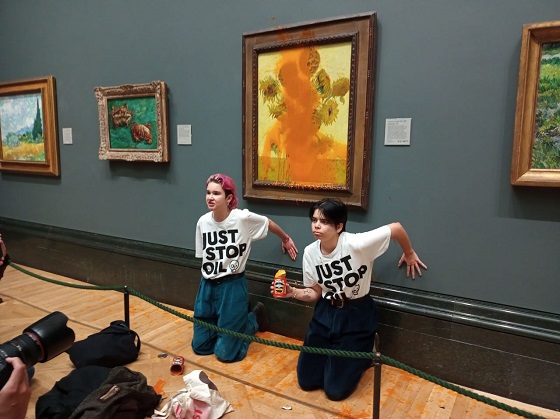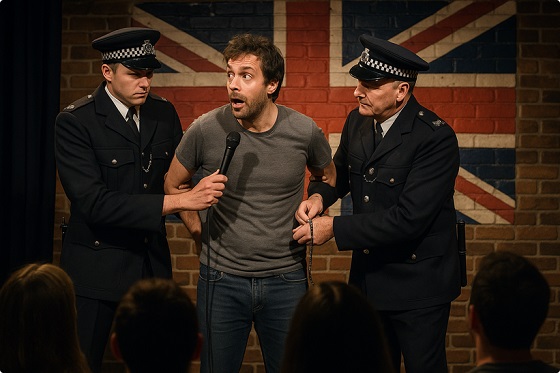Frontier Centre for Public Policy
ECO Extremism under reported in Canada

From the Frontier Centre for Public Policy
How many remember that shortly after the federal government introduced emergency legislation against convoy protesters there was a real terrorist attack on a Coastal GasLink pipeline worksite in British Columbia?
Ottawa and Canadian security agencies are ignoring a threat posed by eco-extremists motivated by self-righteous climate change alarmism.
How many remember that shortly after the federal government introduced emergency legislation against convoy protesters there was a real terrorist attack on a Coastal GasLink pipeline worksite in British Columbia?
About 20 masked assailants wielding axes entered a pipeline worksite and intimidated Coastal GasLink workers and caused millions of dollars of damage to equipment and vehicles.
While politicians and mainstream media were fixated on bouncy castles and hot tubs, armed fanatics were intimidating human beings with weapons and destroying energy infrastructure.
There was bare mention of it in the media. Politicians made cursory mention of it on social media. Unlike the convoy protests, there were no in-depth investigative pieces immediately after the eco-terrorist attacks against Costal GasLink.
Eventually some media picked up on this terror attack, but then downplayed it.
CBC’s Fifth Estate months later aired a program that attempted to disparage an RCMP unit meant to investigate extremist attacks on energy sector infrastructure. In a piece of over 40 minutes, less than a minute was devoted to exploring the February 2022 terror attack.
The CBC wrote more about the attack and did identify the culprits as anarchists but did not explore their ideological motivations. It was almost like they were just anarchists bent on destruction without a coherent ideology.
Perhaps if they would do a deep dive, they would discover that the anarchists believing they are helping an Indigenous resurgence have been raised on a diet of unscientific climate change alarmism.
I recently compiled research for a Frontier Centre study that looked at this looming eco-extremist threat.
Besides the Coastal GasLink attack, there are extremist groups like Just Stop Oil and Extinction Rebellion (in Canada). Traffic disruptions caused by Just Stop Oil have already led to bodily harm and unnecessary deaths in the UK where traffic mayhem ensued over a stunt on a bridge.
Canada has a serious blind spot when it comes to extremism associated with the far left. CSIS and Public Safety Canada are endlessly fixated on extremism associated loosely with the right, like Incels or anyone concerned about forced injections via vaccine mandates.
In Canada, the threat comes from various “Indigeno-anarchists” who believe they are supporting Indigenous people even as they attack energy projects that help First Nation communities. I discovered these extremists teach and recruit at our universities. Many professors are activists who normalize terrorism against the energy sector. Many were involved in the 2019-2020 Wet’suwet’en rail blockades that opposed Coastal GasLink.
Winnipeg activists were certainly involved. During the Wet’suwet’en blockades, they engaged in five major actions in Manitoba, from a demonstration outside an RCMP station to an action where “Indigenous warriors” blocked CN and CP rail tracks for several hours.
Calling themselves anarchists, they engaged in acts that could cause bodily harm and affect people’s ability to travel on passenger trains. Here is a document confirming they intended to commit “railroad sabotage.” Anarchists also make open mention of acts of sabotage and damage to drill sites associated with Coastal GasLink.
Central to the problem is problematic and torqued up climate change rhetoric that is causing unnecessary fear and anxiety within the public and is radicalizing people. If you believe the “earth is on fire” – which is a false belief held by many activists – some become radicalized to commit damage property and threaten lives.
Manitobans and Canadians must address the looming eco-terrorist threat before it’s too late.
Joseph Quesnel is a Senior Research Fellow with the Frontier Centre for Public Policy.
Censorship Industrial Complex
A Democracy That Can’t Take A Joke Won’t Tolerate Dissent

From the Frontier Centre for Public Policy
By Collin May
Targeting comedians is a sign of political insecurity
A democracy that fears its comedians is a democracy in trouble. That truth landed hard when Graham Linehan, the Irish writer behind Father Ted and The IT Crowd, stepped off a plane at Heathrow on Sept. 1, 2025, and was met by five London Metropolitan Police officers ready to arrest him for three posts on X.
Returning to the UK from Arizona, he was taken into custody on the charge of “suspicion of inciting violence”, an allegation levelled with increasing ease in an age wary of offence. His actual “crime” amounted to three posts, the most contentious being a joke about trans-identified men in exclusively female spaces and a suggestion that violated women respond with a swift blow to a very sensitive part of the male’s not-yet-physically-transitioned anatomy.
The reaction to Linehan’s arrest, from J.K. Rowling to a wide array of commentators, was unqualified condemnation. Many wondered whether free speech had become a museum piece in the UK. Asked about the incident, British Prime Minister Keir Starmer defended his country’s reputation for free expression but declined to address the arrest itself.
Canada has faced its own pressures on comedic expression. In 2022, comedian Mike Ward saw a 12-year legal saga end when the Supreme Court of Canada ruled five-to-four that the Quebec Human Rights Commission had no jurisdiction to hear a complaint about comments Ward made regarding a disabled Quebec boy. The ruling confirmed that human rights bodies cannot police artistic expression when no discrimination in services or employment has occurred. In that case, comic licence survived narrowly.
These cases reveal a broader trend. Governments and institutions increasingly frame comedy as a risk rather than a social pressure valve. In an environment fixated on avoiding perceived harm, humour becomes an easy and symbolic target. Linehan’s arrest underscores the fragility of free speech, especially in comedic form, in countries that claim to value democratic openness.
Comedy has long occupied an unusual place in public life. One of its earliest literary appearances is in Homer’s Iliad. A common soldier, Thersites, is ugly, sharp-tongued and irreverent. He speaks with a freedom others will not risk, mocking Agamemnon and voicing the frustrations of rank-and-file soldiers. He represents the instinct to puncture pretension. In this sense, comedy and philosophy share a willingness to speak uncomfortable truths that power prefers to avoid.
Aristotle, in his Poetics, noted that tragedy imitates noble actions and depicts people who are to be taken seriously. Comedy, by contrast, imitates those who appear inferior. Yet this lowly status is precisely what gives comedy its political usefulness. It allows performers to say what respectable voices cannot, revealing hypocrisies that formal discourse leaves untouched.
In the Iliad, Thersites does not escape punishment. Odysseus, striving to restore order, strikes him with Agamemnon’s staff, and the soldiers laugh as Thersites is silenced. The scene captures a familiar dynamic. Comedy can expose authority’s flaws, but authority often responds by asserting its dominance. The details shift across history, but the pattern endures.
Modern democracies are showing similar impatience. Comedy provides a way to question conventions without inviting formal conflict. When governments treat jokes as misconduct, they are not protecting the public from harm. They are signalling discomfort with scrutiny. Confident systems do not fear irreverence; insecure ones do.
The growing targeting of comedians matters because it reflects a shift toward institutions that view dissent, even in comedic form, as a liability. Such an approach narrows the space for open dialogue and misunderstands comedy’s role in democratic life. A society confident in itself tolerates mockery because it trusts its citizens to distinguish humour from harm.
In October, the British Crown Prosecution Service announced it would not pursue charges against Linehan. The London Metropolitan Police Service also said it would stop recording “non-crime hate incidents”, a controversial category used to document allegations of hateful behaviour even when no law has been broken. These reversals are welcome, but they do not erase the deeper unease that allowed the arrest to happen.
Comedy survives, but its environment is shifting. In an era where leaders are quick to adopt moral language while avoiding meaningful accountability, humour becomes more necessary, not less. It remains one of the few public tools capable of exposing the distance between political rhetoric and reality.
The danger is that in places where Agamemnon’s folly, leadership driven by pride and insecurity, takes root, those who speak uncomfortable truths may find themselves facing not symbolic correction but formal sanctions. A democracy that begins by targeting its jesters rarely stops there.
Collin May is a Senior Fellow with the Frontier Centre for Public Policy, a lawyer, and Adjunct Lecturer in Community Health Sciences at the University of Calgary, with degrees in law (Dalhousie University), a Masters in Theological Studies (Harvard) and a Diplome d’etudes approfondies (Ecole des hautes etudes, Paris).
Food
Canada Still Serves Up Food Dyes The FDA Has Banned

From the Frontier Centre for Public Policy
By Lee Harding
Canada is falling behind on food safety by continuing to allow seven synthetic food dyes that the United States and several other jurisdictions are banning due to clear health risks.
The United States is banning nine synthetic food dyes linked to health risks, but Canada is keeping them on store shelves. That’s a mistake.
On April 22, 2025, the U.S. Department of Health and Human Services and the Food and Drug Administration (FDA) announced they would ban nine petroleum-based dyes, artificial colourings that give candies, soft drinks and snack foods their bright colours, from U.S. foods before 2028.
The agencies’ directors said the additives presented health risks and offered no nutritional value. In August, the FDA targeted Orange B and Citrus Red No. 2 for even quicker removal.
The good news for Canada is that Orange B was banned here long ago, in 1980, while Citrus Red No. 2 is barely used at all. It is allowed at two parts per million in orange skins. Also, Canada reduced the maximum permitted level for other synthetic dyes following a review in 2016.
The bad news for Canadians is that regulators will keep allowing seven dyes that the U.S. plans to ban, with one possible exception. Health Canada will review Erythrosine (called Red 3 in the U.S.) next year. The FDA banned the substance from cosmetics and drugs applied to the skin in 1990 but waited decades to do the same for food.
All nine dyes targeted by the FDA have shown evidence of tumours in animal studies, often at doses achievable through diet. Over 20 years of meta-analyses also show each dye increases the risk of attention deficit hyperactivity disorder in eight to 10 per cent of children, with a greater risk in mixtures.
At least seven dyes demonstrate broad-spectrum toxicity, especially affecting the liver and kidneys. Several have been found to show estrogenic endocrine effects, triggering female hormones and causing unwanted risks for both males and females. Six dyes have clinical proof of causing DNA damage, while five show microbiome disruption in the gut. One to two per cent of the population is allergic to them, some severely so.
The dyes also carry a risk of dose dependency, or addiction, especially when multiple dyes are combined, a common occurrence in processed foods.
U.S. research suggests the average child consumes 20 to 50 milligrams of synthetic dyes per day, translating to 7.3 to 18.25 kilograms (16.1 to 40.2 pounds) per year. It might be less for Canadian kids now, but eating even a “mere” 20 pounds of synthetic dyes per year doesn’t sound healthy.
It’s debatable how to properly regulate these dyes. Regulators don’t dispute that scientists have found tumours and other problems in rats given large amounts of the dyes. What’s less clear are the implications for humans with typical diets. With so much evidence piling up, some countries have already taken decisive action.
Allura Red (Red 40), slated for removal in the U.S., was previously banned in Denmark, Belgium, France, Switzerland, Sweden and Norway. However, these countries were forced to accept the dye in 2009 when the European Union harmonized its regulations across member countries.
Nevertheless, the E.U. has done what Canada has not and banned Citrus Red No. 2 and Fast Green FCF (Green 3), as have the U.K. and Australia. Unlike Canada, these countries have also restricted the use of Erythrosine (Red 3). And whereas product labels in the E.U. warn that the dyes risk triggering hyperactivity in children, Canadians receive no such warning.
Canadian regulators could defend the status quo, but there’s a strong case for emulating the E.U. in its labelling and bans. Health Canada should expand its review to include the dyes banned by the E.U. and those the U.S. is targeting. Alignment with peers would be good for health and trade, ensuring Canadian manufacturers don’t face export barriers or costly reformulations when selling abroad.
It’s true that natural alternatives present challenges. Dr. Sylvain Charlebois, a food policy expert and professor at Dalhousie University, wrote that while natural alternatives, such as curcumin, carotenes, paprika extract, anthocyanins and beet juice, can replace synthetic dyes, “they come with trade-offs: less vibrancy, greater sensitivity to heat and light, and higher costs.”
Regardless, that option may soon look better. The FDA is fast-tracking a review of calcium phosphate, galdieria blue extract, gardenia blue, butterfly pea flower extract and other natural alternatives to synthetic food dyes. Canada should consider doing the same, not only for safety reasons but to add value to its agri-food sector.
Ultimately, we don’t need colour additives in our food at all. They’re an unnecessary cosmetic that disguises what food really is.
Yes, it’s more fun to have a coloured candy or cupcake than not.What’s less fun is cancer, cognitive disorders, leaky gut and hormonal disruptions. Canada must choose.
Lee Harding is a research fellow for the Frontier Centre for Public Policy.
-

 Energy2 days ago
Energy2 days agoCanadians will soon be versed in massive West Coast LPG mega-project
-

 Daily Caller2 days ago
Daily Caller2 days agoTom Homan Predicts Deportation Of Most Third World Migrants Over Risks From Screening Docs
-

 Daily Caller10 hours ago
Daily Caller10 hours agoTech Mogul Gives $6 Billion To 25 Million Kids To Boost Trump Investment Accounts
-

 Artificial Intelligence2 days ago
Artificial Intelligence2 days ago‘Trouble in Toyland’ report sounds alarm on AI toys
-

 National1 day ago
National1 day agoMedia bound to pay the price for selling their freedom to (selectively) offend
-

 C2C Journal1 day ago
C2C Journal1 day agoLearning the Truth about “Children’s Graves” and Residential Schools is More Important than Ever
-

 Alberta1 day ago
Alberta1 day agoNew era of police accountability
-

 Business11 hours ago
Business11 hours agoRecent price declines don’t solve Toronto’s housing affordability crisis



